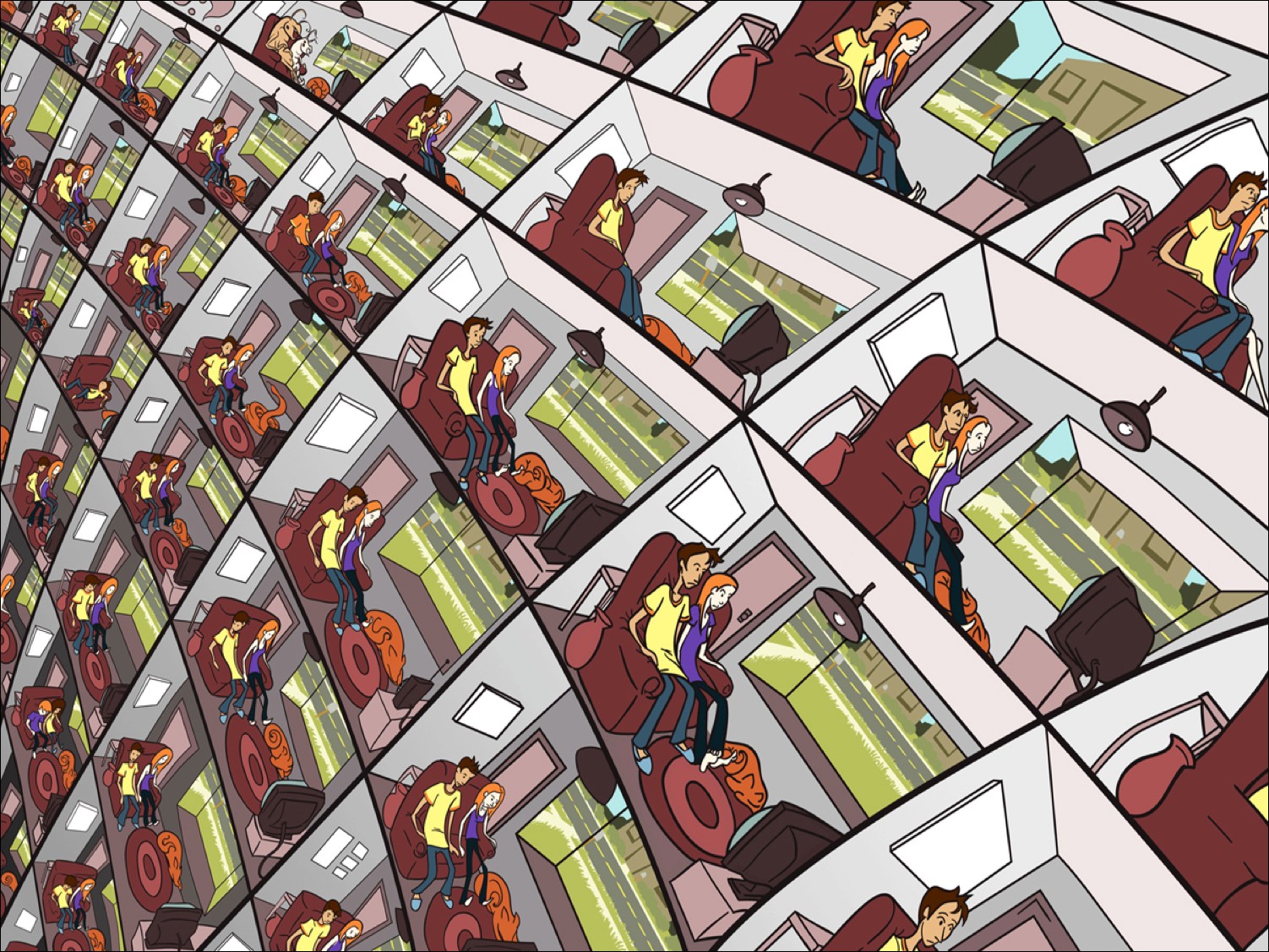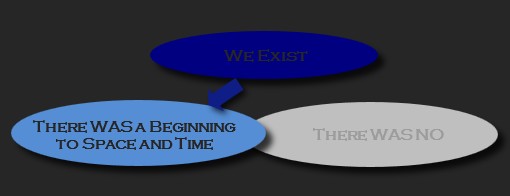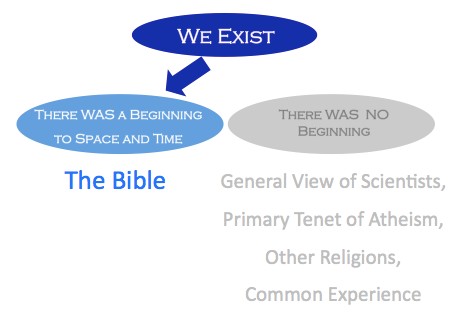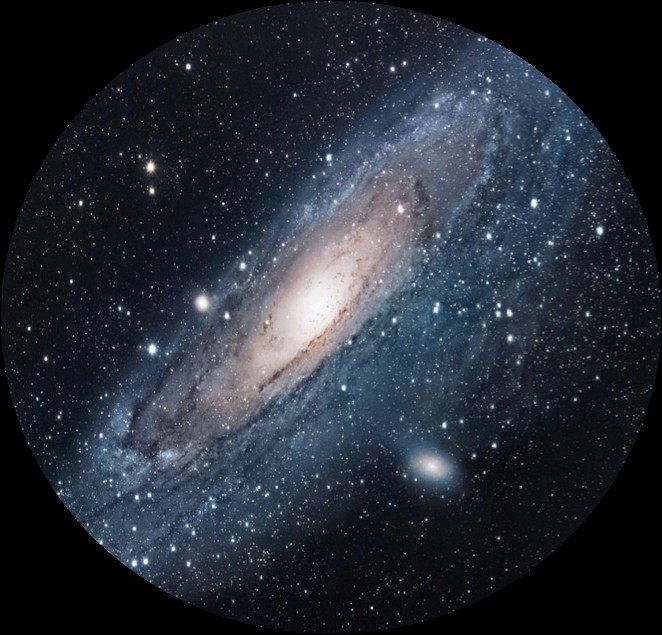The Big Beginning

The BEGINNING Evidence
What was covered so far
- The set of beliefs we have about reality, and our place in it – is our worldview foundation.
- Everyone has a worldview, and choices, responses, goals, priorities, etc, are based on it.
- Different worldviews have similarities, but contradict each other on the biggest ?s in life.
- Since only 1, at most, fits reality, whenever worldviews contradict each other, those not founded on reality will drop you at times during life, and possibly eternally, into unexpected consequences.
- What worldview fits reality – which one is true – you can check. The most effective method is the same approach as the scientific method and what we have used since childhood. Let’s begin …
Observation & Question
Did the universe have a beginning, or did the universe always exist?
Hypotheses (Claims from the Different Worldview Models)
Below is what each worldview model claimed before all the tests came in.
Agnostic Model – Agnostics either claim they do not know, side with the general understanding of the time that there was no beginning, or they claim we can never know if there was a beginning or not.
Atheist Model – There was no beginning. Time and space always existed and always will. This was accepted as fact by the scientific community, and was a primary belief of atheism.
Biblical Model – There was a beginning to space and time. Written thousands of years ago, the biblical model provided a set of specific claims, which went against the other worldview models.
(1) The universe, and all that is a part of the universe, had a beginning (Genesis 1:1, compound use of Hebrew words “shamayim” (heaven) with “aretz” (earth), refers to everything of the entire universe; John 1:3, everything aside from God was created, was caused, and has a beginning).
(2) Time itself had a beginning (Genesis 1:1; Hebrews 1:10; Jude 1:25).
(3) Space and time began together (Genesis 1:1; use of “bārāʾ” refers to divine creating something new out of what was not in existence before, and this happened at “the beginning”).
(4)-(5) The universe came from not anything visible, or of this universe (Gen. 1:1; Heb. 11:3; John 1:3).
(6) The universe follows fixed laws (Jeremiah 33:25-6).
(7) The cause of the universe is given very specific properties (covered in the CAUSE section), and there is much more we can add, but these are enough to make the point.
These predictions are specific, and set up to clearly verify or reject.
Buddhism, Hinduism – Time and space always existed, just recycled.
Others – There are other models, and if yours is not included, then add it in here.
Okay, the different worldviews made their claims, which one fits reality, does any set itself apart?
Bottom-line answers
Whether there was a beginning or not is one of the most prominent features of any worldview. The evidence is in, providing tests of truth to support the accuracy of some worldview(s), and expose the inac uracy of others.
Let’s look at the big questions answered by what we now know about the beginning of the universe?

Question 1: Was there a beginning of the universe? What is the proof?
Answer: The universe had a beginning. From Edwin Hubble to Albert Einstein and other Nobel prize winners, many sources of evidence, such as the cosmic microwave background (CMB) radiation, “ripples” of the Big Bang, and even common sense as noted below. Bottom-line: To not believe in the beginning of the universe, one would have to go against ALL the evidence.
Here is just one point: The stars of the universe run on fuel (hydrogen mostly). Every second through nuclear fusion, the sun turns ~600 million tons of hydrogen into 594 million tons of helium, and releases most of the remaining four million tons of matter as energy radiation and light. If every star we know of runs on hydrogen (and later on some heavier elements too before dying), then what would happen to the fuel supply if the universe did not have a beginning, and was burning this fuel forever? Clearly the universe would have RAN OUT OF GAS. Cosmologist Alexander Vilenkin summarizes: “With the proof now in place, cosmologists can no longer hide behind the possibility of a past-eternal universe. There is now no escape, they have to face the problem of a cosmic beginning.”


Question 2: What happened at the beginning?
Answer: The Bible predicted it. Compare what science now knows to the biblical predictions.
SCIENCE NOW SAYS THE SAME THINGS THE BIBLE PREDICTED THOUSANDS OF YEARS AGO.
What option do you believe? And what reasons support your belief?
What if I tell you that buried just a foot into the concrete, right below this spot in the room, there is a hammer, and sadly (unless you don’t like cats), 20 feet to the right, also buried in the cement are the remains of a cat. Further, if you tear away the drywall in the upper-left corner of this room, you will find the plank too short to reach the ceiling, and on the opposite wall, behind the drywall, someone drew a simple praying mantis.
Now, your curiosity gets the better of you, so after everyone leaves for the night, you get a jackhammer and dig into the concrete where I told you the hammer was – you find a hammer. Additionally, you find the cat remains, short plank and drawing. How do you think I knew this information? Only a few possible options, and you’d be a fool to think option one or two is correct.

Similarly, the Bible predicted multiple, clear, specific things we would find when our curiosity began digging into universe. How do you think the Bible knew this information?
Question 3: What worldview belief is accurate & Which ones conflict with reality?
Answer: The Christian model is proven true in the foundational area of origins. The worldview of the scientific community, and almost every belief system, including agnosticism and atheism, showed time and space having no beginning, but being eternal, which has been found to be

In addition, the biblical model, thousands of years ago, clearly and specifically predicted a number of facts, which have been found to be precisely true with the most important discoveries in all modern science. This is powerful. If anyone fails to accept how significant this is, ask them to find any other source(s), in ALL of history, which has ever matched this same level of foreknowledge of scientific understandings, so specific, and thousands of years before their discovery.
Those close to the discoveries get it:
- Astronomer Sir Frederick Hoyle was confronted with points mentioned above about the beginning of the universe, he believed the universe was eternal and ridiculed the idea of a beginning as “scientific Genesis.” He called the theory the “Big Bang” in his disbelief. The name stuck.
- Robert Jastrow, founder of NASA’s Goddard Institute of Space Studies said: “…astronomical evidence leads to a biblical view of the origin of the world.… the essential element in the astronomical and biblical accounts of Genesis is the same.” (Jastrow, God and the Astronomers, 14.)
- Nobel Prize winners Penzias and Wilson add respectively: “The best data we have (concerning the Big Bang) are exactly what I would have predicted had I had nothing to go on but the five books of Moses, the Psalms and the Bible as a whole.” And, “Certainly there was something that set it all off…. I can’t think of a better theory of the origin of the universe to match Genesis.”
- Mathematical physicist Frank Tipler: “From the perspective of the latest physical theories, Christianity is not a mere religion, but an experimentally testable science.”
Question 4: What makes you think the Bible is from God?
Answer: If you think the Bible is only a product of humanity: Name other books, or anything ever produced by humans, matching the number and level of clear, specific, accurate predictions, given so far in advance of scientific recognition. No person could have known what the Bible provided.
Nothing by man has ever come close. If you think something is comparable, like Nostradamus, or claim the Bible is vague, what’s your evidence? There are standard tests for the validity of a claim or model about reality, including: how well a model explains what we find, how much it explains, are the predictions accurate and difficult to match. The biblical model reaches a level of validation in these tests no other competing claim is able to reach. One cannot rationally walk past this point, unless other examples show the Bible is not entirely alone in this. Many more reasons can be given to support there is something well beyond humanity’s ability in the Bible, but those will be covered in later sections.

